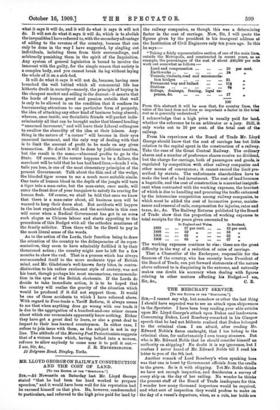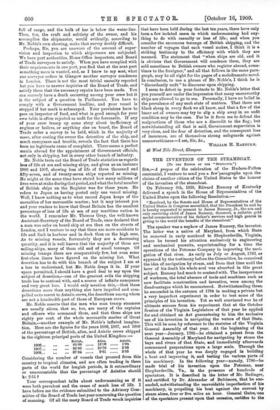THE MERCHANT SERVICE.
[To TRY EDITOR 01 THE "SrEcraToa."]
SIR,—I cannot say why, but somehow or other the last thing I should have expected was to see an attack upon shipowners in the Spectator. I have been busy reading your able articles upon Mr. Lloyd George's attack upon Dukes and landowners. Concerning Dukes, Lord Rosebery remarked in his Glasgow speech that he had not hitherto realised that Dukes belonged to the criminal class. I am afraid, after reading Mr. Edward Noble'■ fierce onslaught, that I too belong to the criminal class, for unfortunately I own tramp steamers. But who is Mr. Edward Noble that he should consider himself an authority on shipping P No doubt it is my ignorance, but I confess I never heard of Mr. Edward Noble till I read his letter to you of the 9th inst.
Another remark of Lord Rosebery's when speaking here was that one is beset by Government officials from the cradle to the grave. So is it with shipping. Yet Mr. Noble thinks we have not enough inspection, and desiderates a survey of every ship on the day of her sailing. No wonder he thinks the present staff of the Board of Trade inadequate for this. I wonder how many thousand inspectors would be required, and what sort of inspection they would profess to make on the day of a vessel's departure, when, as a rule, her holds are
full of cargo, and the bulk of her is below the water-line. Then, too, the craft and subtlety of the owner, and his accomplice the shipmaster, would evidently, according to Mr. Noble's own showing, make that survey doubly difficult.
Perhaps, Sir, you are unaware of the amount of super- vision and inspection to which shipowners are subjected.
We have port authorities, Home Office inspectors, and Board of Trade surveyors to satisfy. When you have complied with their requirements in one port, you find that at the next port something more is wanted, and, as I know to my cost, what one surveyor orders in Glasgow another surveyor condemns in London. There is not the most trivial casualty reported but you have to answer inquiries of the Board of Trade, and satisfy them that the necessary repairs have been made. You can scarcely have a death occurring among your crew but it is the subject of a question in Parliament. You have to comply with a Government loadline, and your vessel is stopped if her mark is submerged. Your provisions have to pass an inspector of food, and what is good enough for your own table is often rejected as unfit for the forecastle. If any of your crew trump up some story about inefficiency of engines or boilers, or anything else on board, the Board of Trade order a survey to be held, which in the majority of cases, after costing the owner the detention of the ship, and much annoyance and trouble, reveals the fact that there has been no legitimate cause of complaint. There seems a perfect mania abroad for the appointment of Government officials, not only in shipping, but in every other branch of industry.
Mr. Noble trots out the Board of Trade statistics as regards loss of life at sea and missing ships, and gives as an instance 1906 and 1907, showing loss of life of three thousand and fifty-seven, and of twenty-seven ships reported as missing. He might at the same time have stated how many millions of lives were at stake during that period, and what the total number of British ships on the Register was for these years. He refers to Japan as having posted only one vessel missing.
Well, I know nothing as to what record Japan keeps of the casualties of her mercantile marine ; but it may interest you and your readers to know that Great Britain has the smallest percentage of loss of life at sea of any maritime nation in the world. I remember Mr. Thomas Gray, the well-known Assistant-Secretary of the Board of Trade, once declared that a man was safer on board ship at sea than on the streets of London, and I venture to say that there are more accidents to life and limb in harbour and in dock than on the high seas.
As to missing vessels, fortunately they are a decreasing quantity, and it is well known that the majority of them are sailing-ships, many of them old and of small tonnage. Of missing tramps there are comparatively few, but even some first-class liners have figured on the missing list. What desertion has to do with this branch of the subject I am at a loss to understand, but Mr. Noble drags it in. If your space permitted, I should have a good deal to say upon the subject of desertion,—one of the greatest evils the shipping trade has to contend with, and a source of infinite annoyance and very great loss. 1 would only mention this,—that these desertions more than anything else have impelled and com- pelled us to resort to Asiatic crews, the desertions among whom are not a hundredth part of those of European crews.
Mr. Noble asserts that the men who man tramp steamers are usually aliens, that so, too, are many of the captains and officers who command them, and that these ships are eighty per cent. of the whole mercantile marine of Great Britain,—another example of Mr. Noble's inflated imagina- tion. Here are the figures for the years 1906, 1907, and 1908 of the percentage of British, alien, and Asiatic crews shipped in the eighteen principal ports of the United Kingdom
Asiatic. British.
1908...••• 85.98 12.08 1-94
1907...••• ... 86'86 10'78 2'38
1908... •.• 87.84 9'81 2'55 Considering the number of vessels that proceed from this country to tropical climate., and are often trading in these parts of the world for longish periods, is it extraordinary or unaccountable that the percentage of Asiatics should b3 2.55 P
Your correspondent talks about undermanning as if it were both prevalent and the cause of much loss of life. I have before me the evidence submitted to the Advisory Com- mittee of the Board of Trade last year concerning the question of manning. Of all the many Board of Trade wreck inquiries
that have been held during the last ten years, there have only been a few isolated cases in which undermanning had any- thing to do with casualty or loss of life; and when you consider the enormous tonnage of British shipping, and the number of voyages that each vessel makes, I think it is a striking testimony to the efficiency with which they are manned. The statement that "when ships are old, and it is obvious that Government will condemn them, they are sold sometimes to British owners who register abroad, some- times to the foreigner," and all that follows in the same para- graph, may be all right for the pages of a melodramatic novel. In conclusion, to use a phrase of Mr. Noble's, I think he is " discordantly unit" to discourse upon shipping.
I seem to detect in your footnote to Mr. Noble's letter that you yourself are under the impression that many unseaworthy ships are allowed to go to sea. Personally, I have no belief in the prevalence of any such state of matters. That there are black sheep in every flock we all know, and that a few of the baser set of owners may try to slip a ship away in an unfit condition may be the case. Far be it from me to defend the malpractices of those who are a discredit to the flag ; but notwithstanding all that is said, Government supervision is very close, and the fear of detection, and the consequent loss of insurance, are of themselves strong safeguards against unseaworthiness.—I am, Sir, &c.,















































 Previous page
Previous page